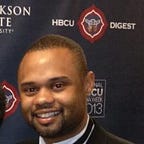Can HBCUs Solve Their Athletic Recruiting Crisis?
The symptoms are well-known, well-documented and persistent over the last few generations — historically black athletic programs, once a bright jewel in the crown of thorns atop the societal ills of segregation and discrimination, can no longer compete. They can’t compete for quality athletes, for corporate support, for fan attention, for media coverage, for championships beyond non-revenue sports like track and bowling.
Flat out, HBCUs can’t compete — but our pride forces our heads to the sky and shoulders to the plow to continue our efforts in building these programs to some level of mid-major respectability, while the rest of college sports mutates within a growing billion-dollar industry of television rights, apparel contracts and corporate synergy.
But behind all of that, there is a dark HBCU secret which never really finds voice in mainstream media — the secret that HBCU athletes of 20 years ago now have athletically gifted children who may be interested in attending HBCUs.
But when they tell coaches and coordinators about their kids, they rarely receive a response, and almost never a formal offer.
Such is the case with Howard University football alumnus Tim Watson, who took to Facebook yesterday to exorcise his frustrations with the lack of recruiting engagement with two of his children, whom he says have now accepted, or are in the process of accepting, scholarships from predominantly white Division I programs.
The post, which drew a response from Howard University President Wayne Frederick, is way too common among HBCU alumni, who seemingly do all they can to funnel their children to HBCUs for sports and academics, only to be turned away by non-response, bad customer service, or flat out rejection without explanation.
There’s no easy way to break down why this happens. Every student who wants to go to a specific HBCU may not be scholastically qualified for that specific campus, and every parent with HBCU wishes for their child may not have met every deadline, paid every fee and followed every step to make it a reality.
Conversely, there are too many coaches and recruiters who are just flat-out lazy, and use the excuse of low-resources as a way to limit their own creativity in reaching out to potential students and athletes, even those inside of their home states.
Given the gray area in between both of those realities, and the unique differences in resources and culture at every school, it’s impossible to suggest that there is a one-stop solution that can work for every campus. But some things are just apparently necessary to close the gap between the athletic assessment of a proud parent, and the limitations of a coach or recruiter exacerbated by a lack of money, general laziness, a lack of oversight, or a combination of all three.
Are coaches and alumni working together to put on football camps in major cities outside of the typical recruiting area? Are we seeking levels of community or corporate support to subsidize camps to make them more affordable for all kinds of families? Are athletic directors and national alumni officers working together to meld budgets for travel, digital recruiting services?
Are high school coaches in talent rich areas being invited to our campuses to tour facilities, to be engaged for advice on how to recruit from their areas? Are we sending those same coaches back with bags of branded equipment or keepsake for student athletes to have during the season? Are we hiring coaches from talent rich areas to give them a shot at Division I or II coaching experience?
Some campuses may have these recommendations checked off. Some may have none. And depending on where you live and where your HBCU is, there’s little that can be done to get a coach from Delaware State to scout a kid in Atlanta when the head coach believes in the talent pipeline he’s built in the New York-New Jersey-Pennsylvania corridor — all of which can be covered without airfare or extended lodging costs.
There’s little that can be done to convince a parent to send his child to football camp in DC when he lives in Houston, hasn’t donated to the athletic program since graduating, and hasn’t spoken of the program until he wanted his child to play for them on a full scholarship.
Of course, that’s not every coach or parent, but maybe there’s enough of both living and acting that way that have contributed to this secret undercurrent of HBCU athletics being stuck in neutral across many schools, conferences and geographic regions. And while the rich are getting richer, everyone outside of our communities is beginning to grow impatient with how long the death of HBCU sports is actually taking. From Vice Sports:
Grambling State, Southern, and other HBCU football programs are technically in Division I’s Football Championship Subdivision, along with other smaller schools, but even then they don’t compete in the FCS playoffs. Rather, due to lack of overall competitiveness, the winners of the Southwestern Athletic Conference (SWAC) and Mid-Eastern Athletic Conference (MEAC) meet in their own “bowl game” at the end of the season. “They want to still have that aura of being a Division I school, but they don’t have the Division I resources,” Polite said.
In short, the black schools are struggling, and essentially segregated from the rest of Division I athletics. And that raises a thorny question: Is it time for them to drop out of Division I altogether?
Is it time for us to drop out? Or is it time for us to step up and move in unison to do something we haven’t done in more than 30 years — compete for our own respect?
